The state of digital disruption in five charts
Who is being disrupted by digital technology and what impact is it having on businesses?


A new research report from Couchbase has investigated enterprises' reactions to digital disruption, surveying 450 heads of digital transformation such as CIOs, CDOs and CTOs in the US, UK, France and Germany.
It shows that the vast majority of industries are facing digital disruption, but that in practice, transformation projects often aren't living up to expectations.
Here, we summarise some of the key findings in five charts.
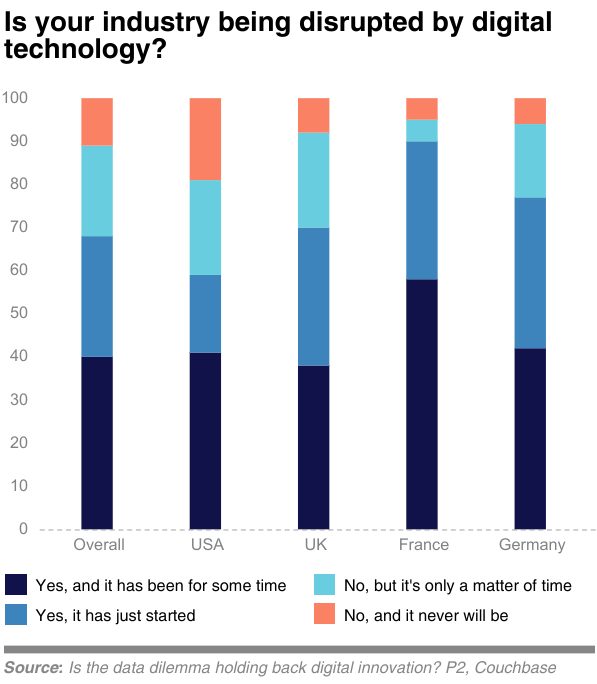
Regardless of its scale, there is no doubt that digital technology has the potential to disrupt industries across the world. Indeed, 73% of digital leaders believe that their industry is being disrupted by digital technology, while a further 16% say that it's only a matter of time.
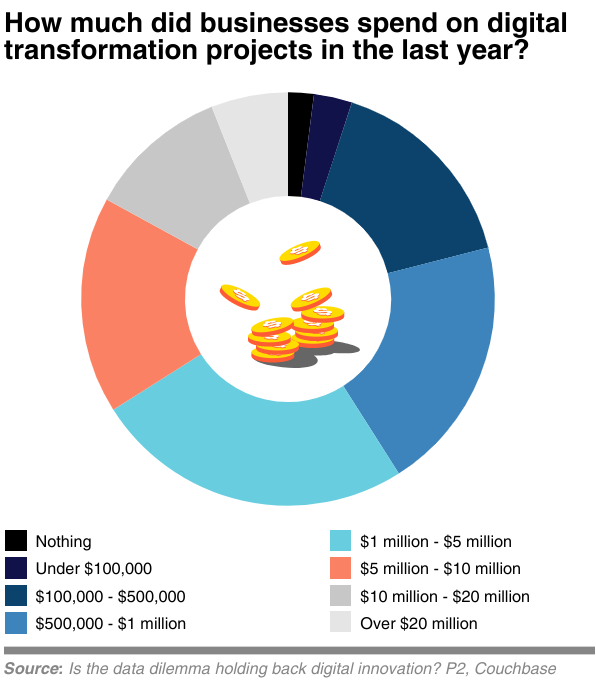
This disruption is reflected in spending. On average, organisations spent $5.67 million on digital innovation and transformation projects in the last 12 months, with 15% spending over $10 million.
As the scale of investment continues to increase within organisations, there will clearly be a great deal more focus on whether objectives are being met and benefits realised.
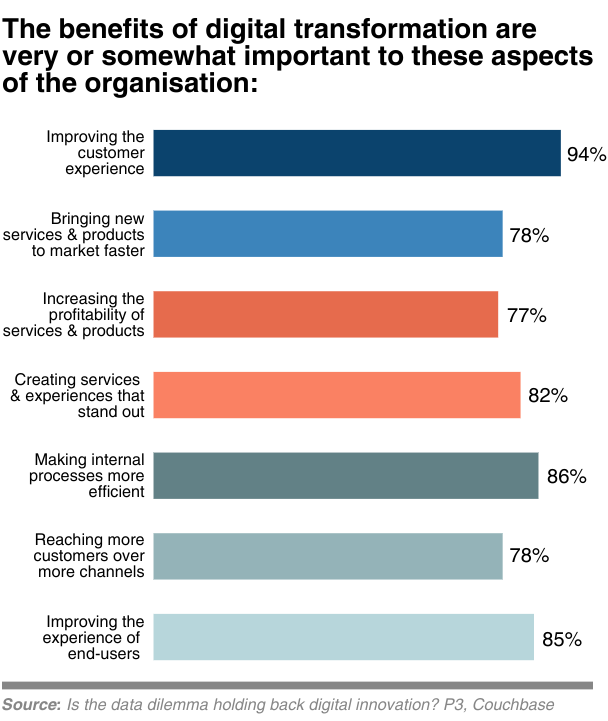
No matter its scale, digital transformation needs clear goals in order to justify the spend. The most important benefit of digital transformation projects that respondents identified was improving customer experience, with 94% claiming it as "very" or "somewhat" important.
Sign up today and you will receive a free copy of our Future Focus 2025 report - the leading guidance on AI, cybersecurity and other IT challenges as per 700+ senior executives
Other significant benefits identified included improving the experience of end-users in the business, making internal processes such as HR, the supply chain and finance more efficient, and creating services and experiences that stand out from the competition.
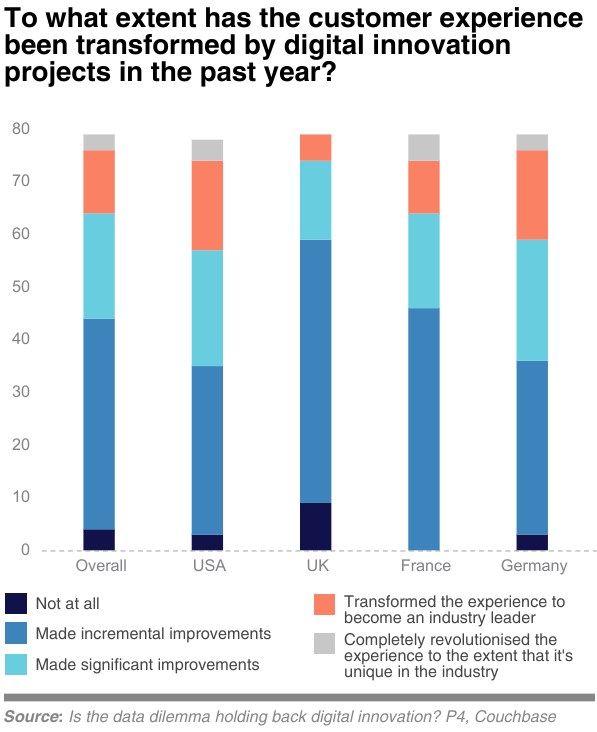
Yet despite all the promises of digital innovation, projects are often falling short of expectations. The great danger for transformation teams is that sizeable investments create results that, while welcome, are still only incremental improvements rather than revolutionary transformations. Almost half of organisations (48%) have only been able to make small improvements in customer experience through digital projects.
At the other end of the scale, 4% claim to have revolutionised the experience to the extent that it's unique in their industry.
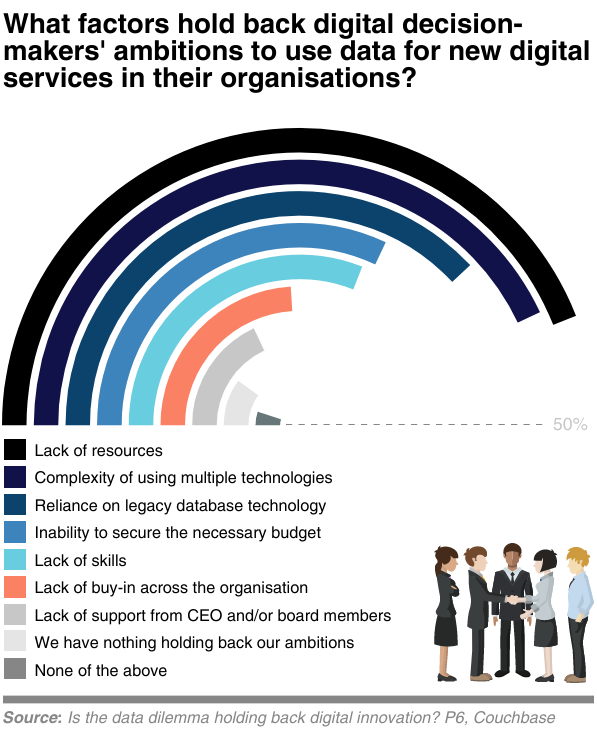
Against this backdrop, digital teams need to use every resource at their disposal, in particular data, to ensure that they can provide truly revolutionary improvements to the business. The use of data is critical to new digital services, but also the ability to use that data in the right way at the right time.
Yet despite its importance, 90% of digital decision-makers feel that their ambitions to use data for new digital services are curtailed by a lack of resources, the complexity of using multiple technologies or reliance on legacy database technology.
Picture: Shutterstock
Esther is a freelance media analyst, podcaster, and one-third of Media Voices. She has previously worked as a content marketing lead for Dennis Publishing and the Media Briefing. She writes frequently on topics such as subscriptions and tech developments for industry sites such as Digital Content Next and What’s New in Publishing. She is co-founder of the Publisher Podcast Awards and Publisher Podcast Summit; the first conference and awards dedicated to celebrating and elevating publisher podcasts.
-
 How to MFA everywhere
How to MFA everywhereIndustry Insights Identity online is not who you are; it is what the system accepts as proof of you, and that gap is exactly what the attackers take advantage of
-
 UK government confirms October cyber breach: Everything we know so far
UK government confirms October cyber breach: Everything we know so farNews Details around Foreign Office hack remain sparse and government says it's unclear who is behind the attack
-
 Chief data officers believe they'll be a 'pivotal' force in in the C-suite within five years
Chief data officers believe they'll be a 'pivotal' force in in the C-suite within five yearsNews Chief data officers might not be the most important execs in the C-suite right now, but they’ll soon rank among the most influential figures, according to research from Deloitte.
-
 UK firms are pouring money into AI, but they won’t see a return on investment unless they address these key issues
UK firms are pouring money into AI, but they won’t see a return on investment unless they address these key issuesNews An SAP report projects increased AI investment, but cautions that too many organizations are taking a fragmented approach
-
 Optimise CX and accelerate business growth through your voice network
Optimise CX and accelerate business growth through your voice networkwhitepaper Protecting the human experience in a digital world
-
 Enterprises are doubling down on IT optimization strategies – and it’s delivering huge financial returns
Enterprises are doubling down on IT optimization strategies – and it’s delivering huge financial returnsNews Organizations that have cracked IT cost optimization and innovation reap the rewards both financially and in terms of time to market.
-
 AI projects are faltering as CDOs grapple with poor data quality
AI projects are faltering as CDOs grapple with poor data qualityNews Chief data officers say they can't maintain consistent data quality, and that it's affecting AI outcomes
-
 IDC InfoBrief: Sustainability doesn’t need to be all stick and no carrot
IDC InfoBrief: Sustainability doesn’t need to be all stick and no carrotwhitepaper CIOs are facing two conflicting strategic imperatives
-
 How to empower employees to accelerate emissions reduction
How to empower employees to accelerate emissions reductionin depth With ICT accounting for as much as 3% of global carbon emissions, the same as aviation, the industry needs to increase emissions reduction
-
 The Forrester Wave™: API management solutions
The Forrester Wave™: API management solutionsWhitepaper The 15 providers that matter the most and how they stack up
